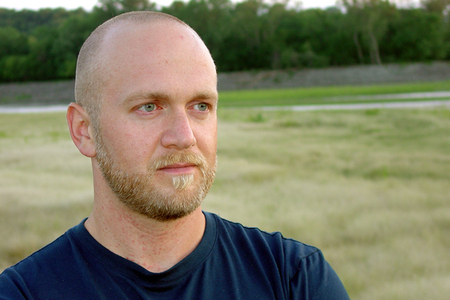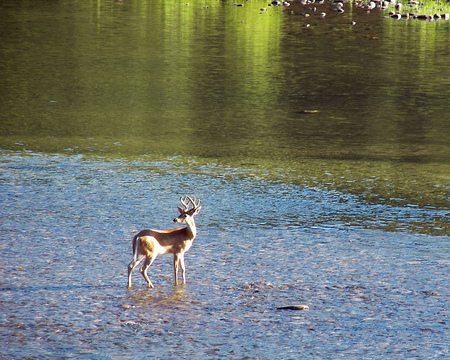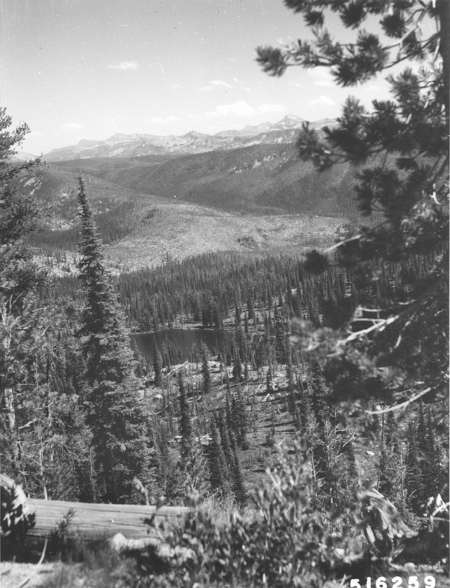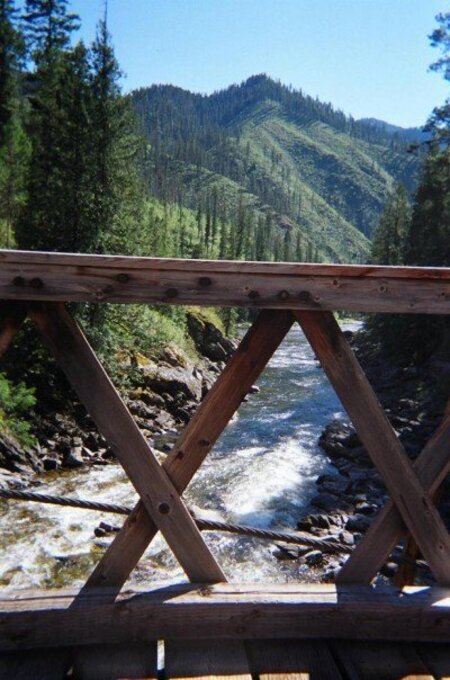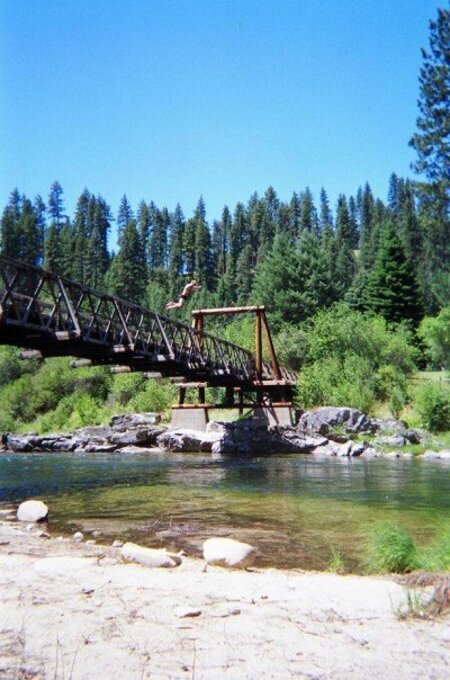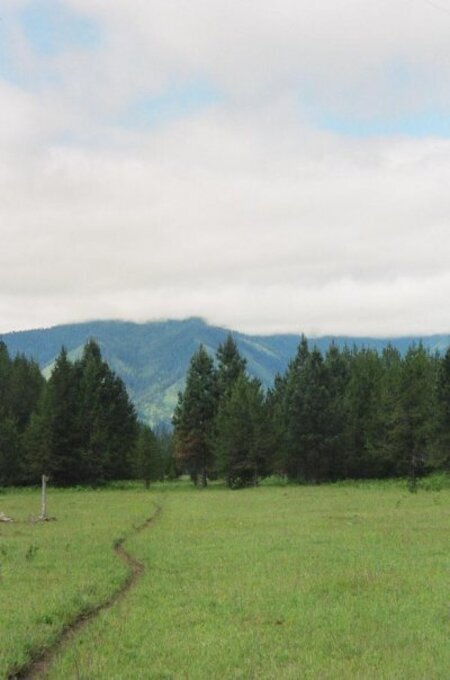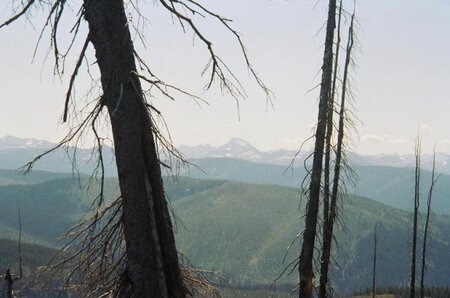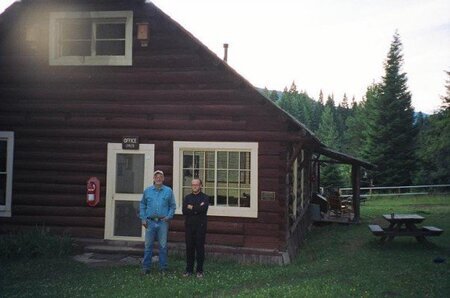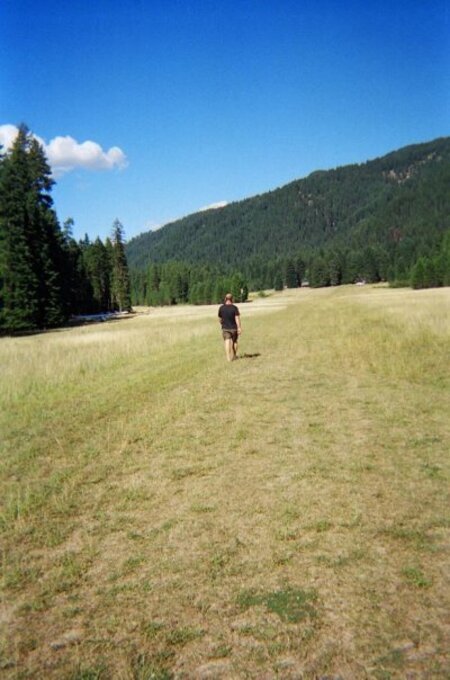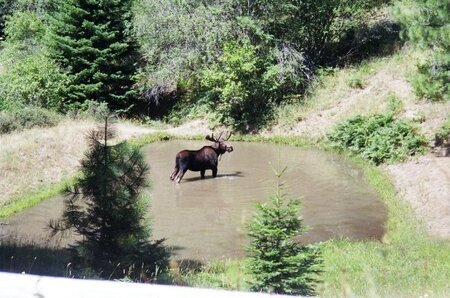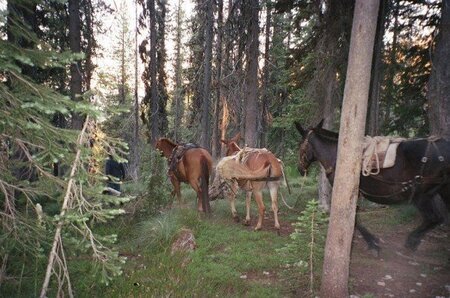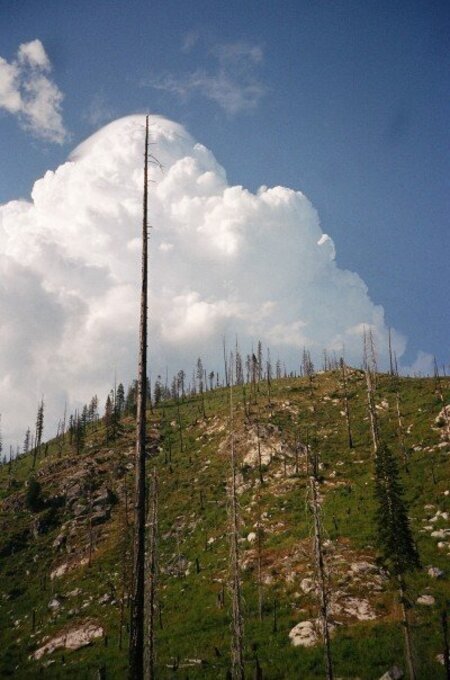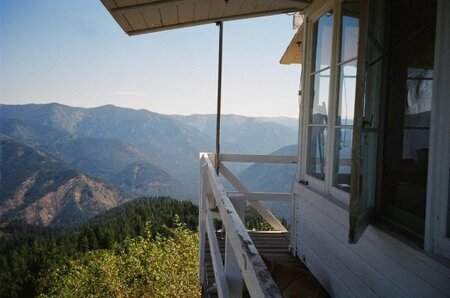Episode 25 : Inspiration : an interview with Josh Dolezal Item Info
In this episode, titled “Inspiration” we hear about some of the poems and stories written by Josh Dolezal, inspired by his time working on fire and trail crews in the Selway-Bitterroot Wilderness in the 1990s. Now an associate professor at Central College in Pella, Iowa, Josh was born near Libby, Montana. He likes to tell people he was “almost born in a teepee.” His parents raised him to be familiar with the outdoors and to appreciate his native Montana landscape. This, combined with his interest in creative nonfiction led him to write these pieces about his time spent in the wilderness.
Episode 25 : Inspiration : an interview with Josh Dolezal [transcript]
00:00:00:00 - 00:00:29:15 Debbie Lee: Welcome to the Subway Bitterroot Wilderness History Project, which is made possible by a grant from the National Endowment for the Humanities. The University of Idaho, and Washington State University. Part of the project’s mission is to collect, preserve, and make public oral histories documenting the history and people of the subway. Bitterroot wilderness. For more information, please visit our website at SPW lib argue Idaho redo.
00:00:29:17 - 00:00:54:14 Debbie Lee: And then I think people, I think people get so much out of being in a wilderness setting once you take away cars and money and telephones, people are different and they are different to each other, I think. And, and, and then they draw on things in themselves that maybe are a little rusty from our crazy life out here.
00:00:54:14 - 00:01:25:12 Debbie Lee: Now, I think the ways that people get along when they’re isolated in a place like that, that they place that they want to be, are really is a wonderful thing.
00:01:25:15 - 00:01:49:11 Debbie Lee: Thank you for joining us for the 25th episode of the Subway Bitterroot Wilderness History Project. In this episode, titled inspiration, we hear about some of the poems and stories written by Josh is all inspired by his time working on fire and trail crews in the Selway Bitterroot Wilderness in the 1990s. Now an associate professor at Central College in Pella, Iowa.
00:01:49:13 - 00:02:08:08 Debbie Lee: Josh was born near Libby, Montana. He likes to tell people he was almost born in a teepee. His parents raised him to be familiar with the outdoors and to appreciate his native Montana landscape. This, combined with his interest in creative nonfiction, led him to write these pieces about his time spent in the wilderness.
00:02:08:11 - 00:02:33:15 Debbie Lee: So I’m really interested in the writing that you’ve done, about the Solway Bitterroot. and I kind of put you in the same category as Norman McLain, you know, in terms of really capturing what that place is. So I’m going to get you to talk a little bit first about your essay survey by headlamp, which was published in Creative Nonfiction.
00:02:33:15 - 00:02:34:02 Josh Dolezal: In fourth.
00:02:34:08 - 00:02:45:06 Debbie Lee: Fourth sonra. Right. so do you want to talk about how that essay. Maybe just talk about the content of it and then how that essay came about?
00:02:45:08 - 00:03:09:23 Josh Dolezal: Yeah, that was the second essay that I wrote about the. So the other it’s called The Sense Mill, and it came out in IHL, which is the Journal for Interdisciplinary Studies of Literature and Environment and the Sense Mill was about my first season hiking in to the Moose Creek cabin when I decided I was going to surprise the crew bus by hiking it in one day.
00:03:09:23 - 00:03:29:25 Josh Dolezal: And he told us, you know, stay overnight at Three Links, which is halfway 13 miles. And it was hot and we got up early, started hiking in the dark, and we’re making good time. I just forgot to drink. I was in good condition, but I just didn’t drink enough water. And I got heat. I got heat cramps and passed out actually at a certain point.
00:03:29:25 - 00:03:55:12 Josh Dolezal: And so the Sense Mill is about it wasn’t necessarily a near-death experience, but when you get, to the point where you’re passing out and you’ve got full body cramps, I mean, it could go either way. Essentially, you’ve extended your body far enough. And so I was sort of meditating on the intensity of that experience, what it was, what I learned about what I thought I learned about near-death from that.
00:03:55:14 - 00:04:18:23 Josh Dolezal: and so with by headlamp sort of picked up with that scene because it was the next summer, I hiked out to go to a conference and hiked up one day and learned my lesson about how to hydrate and it was no problem, really, to hike the distance. It’s a fairly flat river trail, so it wasn’t that that hard.
00:04:18:23 - 00:04:49:15 Josh Dolezal: It was just a matter of drinking often enough. And so I hiked out to my conference. I flew back and in the airport on my way home and talk to my sister, who was going through a divorce. I was distraught about this and realized that I couldn’t probably sleep that night and I just decided to hike all the way in in the dark and so I don’t need to summarize the whole essay, but it was a sort of braided narrative with, you know, concerns in the present.
00:04:49:15 - 00:05:11:03 Josh Dolezal: And all of the milestones along the way and the trail giving me a sense of, These were things that I had experienced in daylight. I was experiencing them in a new way, in the darkness, which was much like this experience. My sister is going through and her divorce in the ripples in the family and friends and all of that.
00:05:11:06 - 00:05:25:06 Josh Dolezal: So, in that sense, I think the survey gave me a chance to reflect on identity, on family, and it was about more than just the wilderness experience. There was a lot. It was a touchstone for my life in other ways.
00:05:25:08 - 00:05:43:25 Debbie Lee: And do you think, the fact of of walking, you know, one foot in front of the other on a river trail, is there something about the pace of walking a wilderness trail and the the pace of of thought? Do those things go together for you?
00:05:43:28 - 00:06:10:00 Josh Dolezal: I think walking is very meditative. I often fall into a kind of trance when I walk. There’s a different rhythm to that than running or cycling. You know, if you’re cycling, you’ve got to pay attention to all kinds of things. You don’t have to if you’re walking, if you’re in good shape and you’re not out of breath or, you know, in pain or something, walking is severely.
00:06:10:03 - 00:06:36:11 Josh Dolezal: Relaxing way of engaging with landscape. And so yeah, I spent a lot of time thinking on the trail I rode. It was the second summer of 2002. I spent most of the summer writing poems. I wrote probably 120 poems and trying to distill them into a manuscript. And so every, every day on the trail I was, I was watching for things, for images that I wanted to share with others.
00:06:36:11 - 00:07:04:17 Josh Dolezal: I often had these thoughts of wanting to share what was happening with friends, and because I was so remote for so long, for three months, I wrote lots of letters. You know, every ten days I would get my stack of mail from the mule packer when he brought in the groceries. So I was in touch with people that way, but I felt fairly cut off, from friends and because it was such a special experience, I had a profound urge to share that.
00:07:04:17 - 00:07:25:28 Josh Dolezal: And so imagistic poetry was one way I tried to do that, and often I was trying to reassemble kind of the raw material of what I was seeing, so that it would culminate in a kind of I don’t want to use the word epiphany necessarily, but I wanted there to be some kind of discovery in the poem. I wanted it to kind of detonate.
00:07:25:28 - 00:07:31:24 Josh Dolezal: And then the last line for the reader, so that there was a sense of that intensity.
00:07:31:27 - 00:07:35:26 Debbie Lee: So, can you give an example or two?
00:07:35:28 - 00:08:02:11 Josh Dolezal: Well, one very short poem that I can quote that is probably better read because it’s so short and harder to probably follow. It’s called geometric, and I can just explain the basic idea. I was thinking about the Pythagorean theorem randomly one day, and thinking about the idea of feeling connected to landscape. I think I was reading Mary Blues Bone deep in landscape at the time.
00:08:02:11 - 00:08:37:11 Josh Dolezal: And and so this idea of the human being connected to the earth and, and I was thinking of the human being, the vertical leg of the triangle and the earth being the horizontal leg and, and the view or sight connecting the two. And so the poem is called geometric. And it goes in glacial basin, scraped clean of all the grass, scattered birds view so plain it could be the square root of the sum of this body, this earth.
00:08:37:13 - 00:08:48:19 Josh Dolezal: So I don’t know if that detonates for the reader in quite the way that it did for me, but I was trying to reassemble the thought process and that kind of connection and an image that would share that experience.
00:08:48:22 - 00:09:02:28 Debbie Lee: So are there a, couple of places in that landscape from where you had that experience, like maybe I’ve have wireless or were you had that experience of looking down and.
00:09:03:00 - 00:09:25:25 Josh Dolezal: Where I wrote that poem, I think on Freeman Peak, or I didn’t write it on The Peak, but it was about that trail going out to, what is that lake past Freeman Peak? I’ve forgotten it’s not a horse lake. I’d have to look at a map to to remember the lake. I only went all the way out to the lake once, because there was so much work to do on that trail.
00:09:25:25 - 00:09:40:04 Josh Dolezal: There was one time that we did a hitch part way and then came back, but it was about the ridgeline up there, which was so spare. And I was just thinking of, you know, the alpine country is so simplified in some ways. It was kind of like that square root idea.
00:09:40:06 - 00:09:49:07 Debbie Lee: Yeah. Well, so you guys did that trail or was that just a trip that you did? did you clear that trail?
00:09:49:09 - 00:10:22:07 Josh Dolezal: Okay. Yeah, we did some erosion control on that. You know, I don’t think that was one of the brushy trails. You know, the big Rock trail was perennially brushy and just difficult. We never fully got that one done, but we had we had several loops that we did. The one that we did probably the most often was up grizzly Saddle across Moose Ridge, and then down through this creek and back up we went, always, up Bailey Mountain, and sometimes we went different ways.
00:10:22:07 - 00:10:44:05 Josh Dolezal: We did a lot of brushing on Bailey Mountain the first summer. so sometimes we’d go up that way and then down past Isaac Lake and, and back to Moose Creek. I know another time we went up moose Creek and camped at the trail junction and, and worked up towards some, some of the Johnson Creek because there had been a serious burn there and lots of cedar had fallen.
00:10:44:05 - 00:10:47:13 Josh Dolezal: And that was quite a job.
00:10:47:15 - 00:10:59:00 Debbie Lee: So you were telling me about your poetry manuscript that you were interested in addressing a different kind of wilderness experience. Can you talk about that?
00:10:59:03 - 00:11:32:10 Josh Dolezal: I think a lot of times wilderness is perceived as a sort of bourgeois concept. You know, that it’s it’s a place where people recreate, where people go to bliss out and, you know, have these mountaintop experiences. But as a seasonal worker and a very different view of it, because I was I enjoyed very much working, feeling that I was caring in some way, stewarding in some way the land, and not just doing a frivolous.
00:11:32:10 - 00:11:59:24 Josh Dolezal: Not that recreation is always frivolous, but it wasn’t just about, escaping from things. I felt kind of connected to the history of the land in a more profound way. Perhaps, and also torrid at times between. One of the reasons I wanted to do Wilderness Trails is I completely lost faith in the fire suppression policy of the Forest Service, because I realized we never fought to defend the trailer court.
00:11:59:25 - 00:12:21:21 Josh Dolezal: You know, we fought to defend trophy homes that have been built in places that they shouldn’t have been built. We fought to protect, timber resource that was meant to be harvested. A lot of the fires we shouldn’t have suppressed. We should have allowed them to burn because they were, you know, meant to burn out some of the downfall, especially in the lodgepole stands.
00:12:21:21 - 00:13:00:03 Josh Dolezal: I remember walking through ten foot deep jackpots of lodgepole blowdown. And, you know, when that burns, it can sterilize the soil or seriously delays the regenerative process. That fire should serve. So I was very disillusioned with that. and I suppose I thought of trail maintenance as a more straightforward, straightforwardly ethical way of caring for the land. But, you know, we were clearing trails for outfitters that were bringing in bear hunters and I felt torn about that.
00:13:00:03 - 00:13:07:29 Josh Dolezal: Sometimes I wished I could just left the trail, die, you know, left the trail.
00:13:08:01 - 00:13:09:03 Debbie Lee: You know, and some.
00:13:09:03 - 00:13:17:24 Josh Dolezal: Overgrown. And. Yeah, I have actually a poem about that.
00:13:17:26 - 00:13:47:29 Josh Dolezal: So this is a poem titled mean, and it was published in the Hudson Review. Cutting brush along a mountain trail. He fights two willful extremes. One desperate to trim back the whole hillside, shearing the bank straight up to the peak, the other longing to let the trail die. Overgrowth smoothing the crease in the gray mountain’s brow. How fragile the middle space where he clears a footpath for a time this labor worth most to himself.
00:13:47:29 - 00:13:58:14 Josh Dolezal: Each sweep of an arm purging dust from his blood and the hearts at his core clean enough for a household of one.
00:13:58:16 - 00:14:29:16 Josh Dolezal: This is another one called June Dream that rained every June that I worked out there. And so this evokes some of that and recall some of the work that I did on the fire crew. Low 40s, overcast and wet rain. Drums on the shingles of an old guard station. And daybreak without dawn, a muted trumpet of sky. And the crew’s hard leather heels thump the frets of the trail.
00:14:29:19 - 00:14:55:09 Josh Dolezal: At the end of the day, I stoke the cast iron stove, propping my boots along the edge to dry, rubbing wet mink oil and wax I can into the seams and the toes. We spread our mummy bags on old canvas cots, and I close the chimney event as the gas lantern sputters out in the dark. I’m left with the smell of woodsmoke, the hint of mold in our clothes, and the glow of my own heat deep in the bag.
00:14:55:11 - 00:15:15:28 Josh Dolezal: Tonight I dream of a caravan of green pickups wending home just before dawn, the longest shift of my first year in a crew. We were done burning logging units for the tree planters, pre-wedding the edges with two inch hose, then lighting strips across the hill with drip torches. A job for late spring when rain and snow temper the burn.
00:15:16:01 - 00:15:38:17 Josh Dolezal: I was driving a club cab, third truck from the rear, my eyes singed with fatigue. Three young men slept in the back seat, draped over each other like jeans in a heap, and my crew boss slumped against the door in the front, his face buried in a fleece. Hanna, the other rookie on the crew, sat next to me, the red lights on the dash mirrored in her eyes.
00:15:38:19 - 00:16:06:22 Josh Dolezal: I could smell her skin lotion in the woodsmoke my gaze locked on the tail lights of the truck ahead as my palm crept down the shift to her name as we turned to snore from the back, made me slip my hand high up on the wheel, cinching my grip in my dreams. She nestles against my shoulder as we take on the shape of two ridgelines, the silhouettes of our heads like twin peaks beneath a knuckled moon.
00:16:06:25 - 00:16:36:14 Josh Dolezal: And then I’ll just read one more. This is the title from the manuscript. And this was toward the end of the summer. I remember seeing someday Johnson Creek, which was at that time a fresh burn. So I think it had burned the year previously or two years prior to our visit. And I remember just walking through this moonscape on the top of the ridge and seeing this little ribbon of green that came down through the middle of that.
00:16:36:14 - 00:16:58:26 Josh Dolezal: And it was that series of very gentle little pools. And you could just, you know, it was a hot spring that you could just sit in the pool and have a bath. And it was kind of a heavenly spot to discover on a hot day. So this is someday, Johnson Creek. It starts with an epigraph from Hilda Raz from her book What It’s Good.
00:16:58:28 - 00:17:25:07 Josh Dolezal: I have had this lesson not to care for the bones. Late in a trail, hitch grown brown with sun, solid with miles of climbs, I dropped my pack by an alpine stream, cresting the ridge to watch for the others free of weight. My chest a wide house of sky. These 500 yards could be life after death. An unending sprint with no need of rest.
00:17:25:10 - 00:17:42:22 Josh Dolezal: But if bad luck lets me die in a house instead of on bare grass, send the body to school. Let them learn what they can, so long as they grind the remains and spread them on. These craggy peaks where the flies do their work with the sun.
00:17:42:25 - 00:18:09:27 Debbie Lee: Thank you for joining us for this episode of the Selway Bitterroot Wilderness History Project, which has been made possible by the National Endowment for the Humanities, the University of Idaho, and Washington State University. The project coordinator is Debbie Lee, recorded and produced by Aaron Jepson.
Gallery
- Title:
- Episode 25 : Inspiration : an interview with Josh Dolezal
- Creator:
- Debbie Lee; Josh Dolezal
- Date Created (ISO Standard):
- 2011-10-07
- Description:
- Interviewee: Josh Dolezal | Interviewer: Debbie Lee | Location: Missoula, Montana | Date: October 7, 2011 | In this episode, titled 'Inspiration' we hear about some of the poems and stories written by Josh Dolezal, inspired by his time working on fire and trail crews in the Selway-Bitterroot Wilderness in the 1990s.
- Subjects:
- podcasts wilderness personal recollections fire fire suppression firefighting conservation authors
- Section:
- Wilderness Voices
- Location:
- Selway-Bitterroot Wilderness (Idaho and Mont.)
- Publisher:
- Wilderness Voices, The Selway-Bitteroot Wilderness History Project, https://selwaybitterrootproject.wordpress.com/
- Original URL:
- https://selwaybitterrootproject.wordpress.com/2012/08/09/inspiration/
- Source Identifier:
- Selway-Podcast-ep25
- Type:
- Sound
- Format:
- audio/mp3
- Language:
- eng
- Preferred Citation:
- "Episode 25 : Inspiration : an interview with Josh Dolezal", The Selway-Bitterroot Wilderness History Project, University of Idaho Library Digital Collections, https://www.lib.uidaho.edu/digital/sbw/items/sbw307.html
- Rights:
- Copyright: The Selway-Bitteroot Wilderness History Project. In Copyright - Educational Use Permitted. For more information, please contact University of Idaho Library Special Collections and Archives Department at libspec@uidaho.edu.
- Standardized Rights:
- http://rightsstatements.org/vocab/InC-EDU/1.0/

